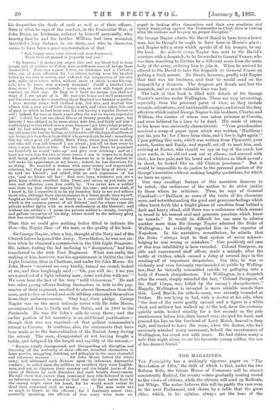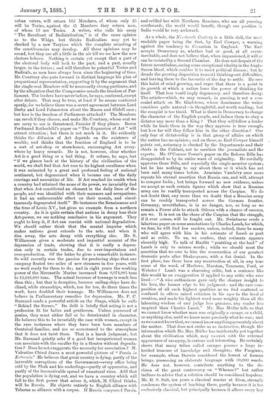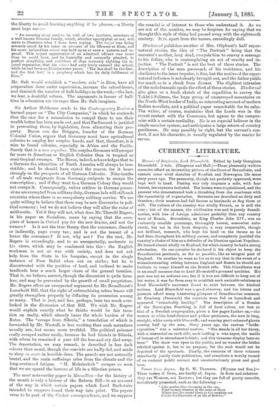THE MAGAZINES.
TEE Fortnightly has a strikingly vigorous paper on "The Revolution of 1884," the drift of which is that, under the two Reform Bills, the future House of Commons will be almost consistently Radical, the county voters gradually coming round to the views of citizens, while the citizens will send up Radicals, not Whigs. The writer believes this will be partly the case even in the next Parliament, and shows by a table that the great cities, which, in his opinion, always set the tone of the urban voters, will return 102 Members, of whom only 25 will be Tories, against the 41 Members they return now, of whom 13 are Tories. A writer, who calls his essay " The Resultant of Redistribution," is of the same opinion as to the Whigs, but thinks Radicalism may yet be checked by a new Toryism which the complete recasting of the constituencies may develop. All these opinions may be sound, but they are all a little in the air till we see how the new electors behave. Nothing is certain yet except that a part of the electoral body will look to the past, and a part, usually larger, to the future ; and will therefore be potential Tories and Radicals, as men have always been since the beginning of time. Mr. Courtney also puts forward. in distinct language his plan of proportional representation, supporting it by the argument that the single-seat Members will be necessarily strong partisans, and by the allegation that the Compromise assails the freedom of Parliament. The leaders have neverbefore, he says, conferred, except after debate. That may be true, at least if he means conferred openly, for we believe there was a secret agreement between Lord Derby and Lord Palmerston about the Mason and Slidell case ; but how is the freedom of Parliament attacked ? The Members can revolt if they choose, and make Mr. Courtney, whose seat we are sorry to see is threatened, Premier if they please. Baron Ferdinand Rothschild's paper on " The Expansion of Art " will attract attention ; but there is not much in it. He evidently thinks the diffusion of Art depends on the existence of wealth; and thinks that the function of England is to be a sort of art-shop or store-house, encouraging Art everywhere by heavy rewards. He is not, however, clear whether Art is a good thing or a bad thing. It refines, he says, but "if we glance back at the history of the civilisation of the world, we shall find that Art rose to its highest excellence when it was animated by a great and profound feeling of national sentiment, but degenerated when it became one of the daily cravings and necessities of life. If Art reached its zenith when a country had attained the acme of its Dower, we invariably find that when Art constituted an element in the daily lives of the people, and was identified with their manners and occupations, it bad an unfavourable effect on their morals, and simultaneously degenerated itself." He instances the Renaissance and the time of Louis XV., but gives no example from a northern country. As it is quite certain that nations in decay lose their Art-power, we see nothing conclusive in his argument. They ought to keep it, if Art can coexist with national degradation. We should rather think that the mental impulse which makes nations great extends to the arts, and when it dies away, the arts decay with everything else. Mr. S. Williamson gives a moderate and impartial account of the depression of trade, showing that it is really a depression only in certain trades, due to over-importation and over-production. Of the latter he gives a remarkable instance. So wild recently was the passion for producing ships that one company floated two miles of new steamers in five years, with no work ready for them to do ; and in eight years the working power of the Mercantile Marine increased from 9,974,995 tons to 14,646,860 tons. The actual increase of tonnage is much less than this ; but that is deceptive, because sailing-ships have declined, while steamships, which, ton for ton, do three times the work, have doubled their tonnage. Mr. Williamson does not believe in Parliamentary remedies for depression. Mr. F. C. Burnand sends a powerful article on the Stage, which he calls "Behind the Scenes." Its drift is briefly that acting is not a profession fit for ladies and gentlemen. Unless possessed of genius, they must either fail or be deteriorated in character. He believes this to be invariably the case with women, except in the rare instances where they have been born members of theatrical families, and are so accustomed to the atmosphere that it does not taint them. That is a harsh judgment; but Mr. Burnand quietly asks if a good but inexperienced woman can associate with the smaller fry in a theatre without degradation ? Does he not exaggerate the necessity for association ? M. Valentine Chirol draws a most powerful picture of " Persia in Extreinis." He believes that great country is dying, partly of the incurable corruptions of the Government—every office being sold by the Shah and his underlings—partly of oppression, and partly of the inconceivable spread of unnatural vices. Add that the population is dying out, and we have a country which will fall to the first power that seizes it, which, M. Chirol thinks, will be Russia. He objects entirely to English alliance with Teheran as alliance with a corpse. If Russia conquered Persia,
and refilled her with Northern Russians, who are all pressing southwards, the world would benefit, though our position iu India would be very awkward.
As a whole, the Nineteenth Century is a little dull, the most readable paper being the first, by Earl Cowper, a warning against the tendency to C.esarism in England. The Earl accepts Democracy as, whether bad or good, at all events inevitable, and does not believe that, when impassioned, it will or can be resisted by a Second Chamber. He does not despair of the future nevertheless, seeing some exceptional vitality in the AngloSaxon blood, which enables it to resist political disease ; but he dreads the growing disposition to avoid thinking-out difficulties, and leaving them to the favourite of the day to settle. Ho sees this habit of mind growing, and urges that there is a point in its growth at which a nation loses the power of thinking for itself. That loss would imply degeneracy, and therefore decay. The article—which, we may remark, in passing, is not a concealed attack on Mr. Gladstone, whose dominance the writer considers quite natural—is thoughtful, and worth reading; but the essayist is too timid. What is there in Democracy to change the character of the English people, and induce them to obey a dictator any more than a King ? That they will follow a leader while he leads them in the way they approve is true enough, but haw far will they follow him in the other direction ? Our only fear of dictatorship is in that group of affairs on which the nation has no opinion ; and on these, as Earl Cowper himself points out, autocracy is checked by the Departments and their chiefs in the Cabinet, not to mention the journalists and the experts. Mr. O'Connor Power's paper on the Reform Bills has disappointed us by its entire want of originality. He cordially approves those Bills, and especially the single-member system; but he has nothing to say about them or it which has not been said many times before. Arminius Vamb4ry once more repeats his eternal assertion that Russia can, and will, attempt to conquer India ; but brings forward no new evidence, unless we accept as such certain figures which show that a Russian army can be readily transported across the Caspian. We do not doubt that, any more than we doubt that a Russian army can be readily transported across the German frontier. Germany, nevertheless, is in no danger, nor, so long as we remain a, Power able to attack Odessa with a chance of success, are we. It is not on the shore of the Caspian that the struggle, if it ever comes, will be fought out. Mr. Swinburne sends a laborious paper on some annotations by Charles Lamb, for which, we fear, he will find few readers, unless, indeed, there be many who will agree with him in his estimate of Lamb as poet and as critic. To us, we confess, that estimate appears absurdly high. To talk of Hazlitt " prattling at the heel" of Lamb is only to misuse words ; while we should meet the assertion that we owe to him the resurrection of our greatest dramatic poets after Shakespeare, with a flat denial. In the first place, has there been any resurrection at all, in any true sense of the word, of Marlowe, Marston, Tourneur, Ford, or Webster ? Lamb was a charming critic, but a sentence like this would be an exaggeration if applied to any critic who ever lived :—" A wise enthusiasm gave only the sharper insight to his love, the keener edge to his judgment : and the rare composition of all such highest qualities as we find scattered or confused in others raised criticism in his case to the level of creation, and made his lightest word more weighty than all the labouring wisdom of any judge less gracious, any reader less inspired than Charles Lamb." Mr. Max Muller tells us that we cannot know whether man was originally a savage, or a child, or anything else, until we know more precisely what he was ; and as we cannot know that, we cannot know anything accurately about the matter. That does not strike us as instructive, though tha information which Mr. Max Muller has incidentally put together about the civilisation which . may co-exist with the external appearance of savagery, is curious and interesting. He certainly shows that many tribes called savages possess a large inherited treasure of knowledge and thoughts; the Fuegians, for example, whom Darwin considered the lowest of human beings, possessing an elaborate language with 30,000 words. He does not, however, contribute anything to the decision of the great controversy on "Whence ?" but rather inclines to advise that a solution should be considered hopeless. Mr. H. S. Salt, ten years a classical master at Eton, strongly condemns the system of teaching there, partly because it is too exclusively classical, but principally because it allows every boy
the liberty to avoid learning anything if he pleases,—a liberty most boys use :
" An amusing story used to be told of two brothers, members of a well-known Etonian family, which, whether apocryphal or not, will serve to illustrate what I have been saying. The major was being severely rated by his tutor on account of his idleness at Eton, and his more industrious minor was held up as at once a pattern and reproof. This unjust aggravation of an admitted offence was more than he could bear, and he hurriedly and earnestly pleaded, in perfect simplicity, and confident of thus instantly righting his injured reputation, that his minor had only lately entered the school, while he had been an Etonian some years. The last shall be the first, and the first last,' is a prophecy which has its daily fulfilment at Eton."
Mr. Salt would establish a "modern side" in Eton, have all preparation done under supervision, increase the school-hours, and diminish the number of half-holidays in the week,—the last, we fear, a doubtful reform. The arguments in favour of halftime in education are stranger than Mr. Salt imagines.
Sir Arthur Hobhouse sends to the Contemporary Review a learned paper on " The City Companies," in which he contends
that the case for a commission to compel them to use their wealth better has been made out, and that Parliament is justified in preventing them, by legislation, from alienating their pro perty. Baron von der Briiggen, founder of the German Colonial Union, argues that Germany must have agricultural colonies to employ her surplus hands, and that, therefore, it is wise to found colonies, especially in Africa and the Pacific.
Surely that is a non sequitur. The surplus Germans will prosper far more in American or English • Colonies than in tropical or semi-tropical swamps. The Baron, indeed, acknowledges that to a German the attraction of North America will always be irre
sistible; and he should have stated the reason, for it bears strongly on the prospects of all German Colonies. Nine-tenths
of all male emigrants from Germany emigrate to escape the conscription ; and if they went to a German Colony they would not escape it. Consequently, unless settlers in German possessions are exempted from military duty, German lads will still seek countries where there is no compulsory military service. We are quite willing to believe that there may be new discoveries in political economy ; but we do not believe they will alter the rules of arithmetic. Yet if they will not, what does Mr. Thorold Rogers, in his paper on Socialism, mean by saying that the occupiers of houses in Oxford pay for the new drains, and not the owners ? Is it not the true theory that the consumer, directly or indirectly, pays every tax; and is not the tenant of a house the consumer ? If not, why not ? For the rest, Mr. Rogers is exceedingly, and to us unexpectedly, moderate in his views, which may be condensed into this : the English workman is not at war with society, and does not ask help from the State in his bargains, except in the single instance of Poor Relief when out on strike ; but he is discontented with the position of land, and inclined to make landlords bear a much larger share of the general taxation. That is, we believe, correct, though the discontent is quite formless, and may be prevented by the growth of small proprietors. Mr. Rogers offers an unexpected argument for Mr. Broadhurat's Leasehold Bill, that the right of enfranchising urban leases will greatly strengthen property by diffusing its possession among so many. That is just, and has, perhaps, been too much overlooked in the discussion of that Bill. We wish Mr. Rogers would explain exactly what he thinks would be fair taxation on realty, which already bears the whole burden of the Rates. The "escape from Siberia," a translation of which is forwarded by Mr. Westall, is less exciting than such narratives usually are, but seems more truthful. The political prisoner really escaped rather easily, because he had friends in Siberia, with whom he remained a year till the hue-and-cry died away. The deportation, we may remark, is described in less dark colours than usual, though the convicts are badly-fed, and made to sleep en route in horrible dens. The guards are not naturally brutal, and the main sufferings arise from the climate and the long-continued fatigue. " M. Mokrievitch " escapes so soon that we are spared the horrors of life in a Siberian prison.
The most noteworthy paper in Macmillan—for the history of the month is only a history of the Reform Bill—is an account of the way in which certain papers which Lord Backstairs intended to suppress found their way into print. The papers seem to be part of the Croker correspondence, and we suppose
the scandal is of interest to those who understand it. As we are not of the number, we may be forgiven for saying that we thought this style of thing had passed away with the eighteenth century. It is, apart from the names, exceedingly dull.
Blackwood publishes another of Mrs. Oliphant's half supernatural stories, the idea of "The Portrait" being that the narrator's mother, long dead, compels him to convey a message to his father, who is contemplating an act of cruelty and injustice. " The Portrait" is not the best of these stories. The description of the man possessed, of his resistance, and his obedience to the inner impulse, is fine, but the motive of the supernatural influence is not clearly brought out, and the father yields too much as to a shock from disease. The slightest intrusion of the melodramatic spoils the effect of these stories. Blackwood also gives us a fresh sketch of the expedition to survey the Takht-i-Soliman, the huge group of unsnrveyed mountains on the North-West border of India, an interesting account of modern Italian novelists, and a political paper remarkable for its calm. The writer, of course, maintains that the Lords won in the recent contest with the Commons, but agrees to the compromise with a certain cordiality. He is an especial believer in the single-member system, and anticipates a large return of country gentlemen. He may possibly be right, but the servant's conduct, if not his character, is usually regulated by the master he serves.












































 Previous page
Previous page